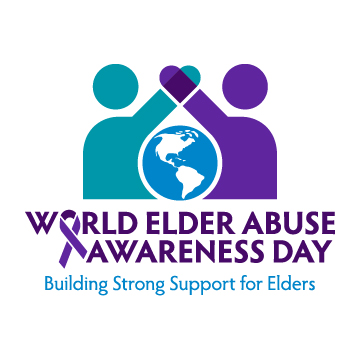World Elder Abuse Awareness Day

This week was Elder Abuse Awareness Day. It is such an important topic and one we felt compelled to write about at Careseekers. We spoke to Yvonne Lipianin of Justice Connect who told us more about elder abuse and its prevalence in Australia.
What is elder abuse?
Elder abuse is a form of family violence that is under-recognised and under-reported in Australia. It can take different forms: physical, psychological, financial, sexual, or neglect. The World Health Organisation defines elder abuse as “a single or repeated act, or lack of appropriate action, occurring in any relationship where there is an expectation of trust, which causes pain or distress to an older person”. By elder abuse we are therefore referring to abuse perpetrated by a person an older person knows and trusts – such as family members, friends and carers – rather than strangers.
How big an issue is it in Australia today?
Compared to other forms of family violence, elder abuse remains relatively societally hidden in Australia: a lack of community awareness, ageism, and the invisibility of the elderly have resulted in the issue being under-researched and under-reported. Barriers to older people disclosing abuse include shame, fear of institutionalisation, and fear of getting family members into trouble, all of which contribute to a limited understanding of just how widespread a problem it is. The federal government is currently talking about conducting a nationwide prevalence study into the issue, however as yet no such survey has taken place. According to estimates by the World Health Organisation however, in countries like Australia elder abuse could affect anywhere between 2% to 14% of older people.
Has it always been an issue, are there any contributing factors as to why we are hearing about it more?
As with domestic violence, it is likely that elder abuse has always been an issue in our society, but it is one that has until recently remained quite hidden for the reasons outlined above. One reason we may now be hearing more about it is the concern that the problem is growing due to our ageing population. In NSW, it is only in the last 10 years that momentum has picked up on the issue, with the release of the Interagency Protocol for Responding to Abuse of Older People in 2007, the release of the NSW Ageing Strategy in 2012, and the establishment of the NSW Elder Abuse Helpline and Resource Unit (EAHRU) in 2013. The NSW Parliament also established a Legislative Council Inquiry into elder abuse in 2015, which produced a number of recommendations, and the Australian Law Reform Commission is due to imminently release a final report on the issue following its own inquiry in 2016.
Who is most at risk for elder abuse?
Elder abuse is an issue that affects people of all demographic and cultural backgrounds. There is some evidence however to suggest that certain groups in society may be at heightened risk. Research indicates that people who don’t speak English are particularly at risk, due to the social isolation and high dependence on family members that can sometimes result. Women are also understood to be disproportionately affected by the issue. People living in rural areas may be particularly vulnerable, given the lack of access to services and shame about disclosing abuse in rural communities. The issue may also play out differently in Aboriginal communities due to cultural obligations like reciprocity and kinship. There is still far too little that is understood about the issue however to draw any firm conclusions about who is most at risk.
Who are the worst perpetrators of elder abuse?
Evidence across Australia suggests that adult children are the largest group of perpetrators of elder abuse. According to the NSW Legislative Council report from June 2016, data collected by EAHRU between 2013-2015 shows that in 71% of calls the alleged perpetrator was a family member, with sons making up 26% of perpetrators and daughters 21%. Spouses were the perpetrators of abuse in 12% of cases.
Signs of Elder Abuse
The signs of elder abuse are likely to differ depending on the type of abuse experienced.
For financial abuse, indicators of abuse may include:
- an inability to pay bills;
- significant, unexplained withdrawals from the older person’s account;
- lack of money to pay for essentials like food, clothing or utilities; and
- cancellation or refusal of community services.
For psychological abuse, signs include
- feelings of helplessness and shame;
- depression and social withdrawal; and changes in levels of self-esteem;
- Signs of neglect include inadequate clothing; poor personal hygiene; and unexplained weight loss.
Indicators of physical abuse may include
- unexplained injuries,
- while signs of sexual abuse may include unexplained STDs;
- torn or bloody bedding;
- difficulty walking or sitting;
- and fear of being touched.
Who should we talk to if we think someone we know is experiencing elder abuse?
If you are concerned that an older person is at risk of imminent danger or harm, contact emergency services on 000. Where the risk is less immediate, in NSW the Elder Abuse Helpline is a free, confidential telephone service for anyone who is concerned that an older person living in the community is being abused or is at risk of abuse. The Helpline provides information, support and referrals to counselling, legal, and other support services as appropriate. It is available Monday to Friday between 8.30 am to 5 pm, and can be contacted on 1800 628 221.
For concerns about abuse experienced by older people living in residential aged care, call the Aged Care Complaints Commissioner on 1800 550 552.
About Justice Connect
Justice Connect is a community legal centre in Victoria and NSW, offering free legal assistance to disadvantaged and vulnerable groups in society and the organisations that support them. Its Seniors Law program has established three Health Justice Partnerships (HJPs) in Melbourne and one HJP in Sydney to specifically assist older people experiencing or at risk of elder abuse. HJPs are a collaborative partnership between legal and health services to try to address the social issues that impact on a person’s health. By integrating a lawyer into the healthcare team at a hospital or community health centre, the lawyer is able to work closely with health staff to reach and provide help to those people most vulnerable to abuse, who would most likely not otherwise have seen a lawyer. For any questions about Justice Connect’s HJP in Sydney, contact Yvonne Lipianin on (02) 8599 2111.
To become a care or support worker, please visit www.careseekers.com.au/carer
To find aged care services, please visit https://www.careseekers.com.au/services/aged-care-workers
To find disability support services, please visit https://www.careseekers.com.au/services/disability-support-workers
